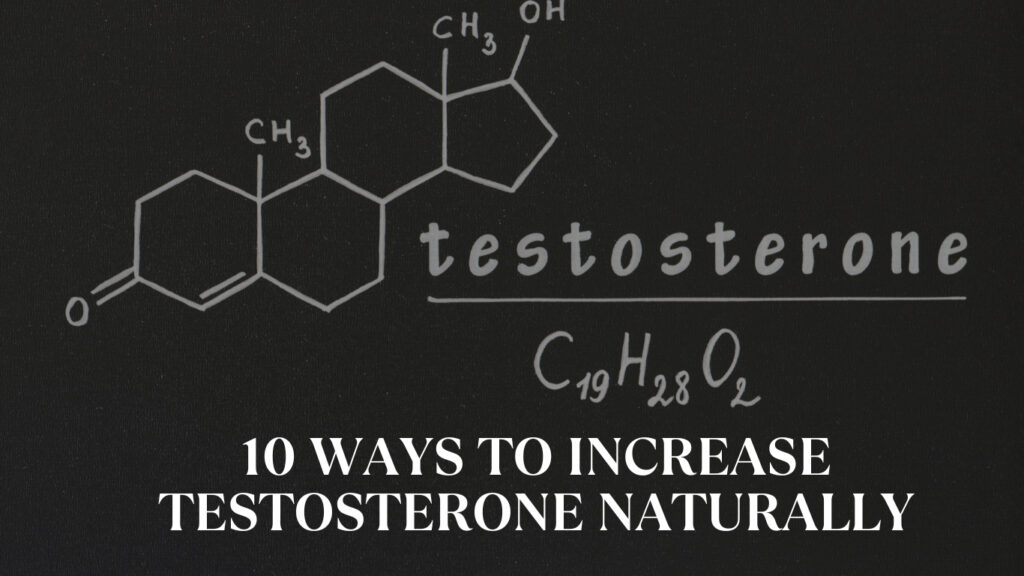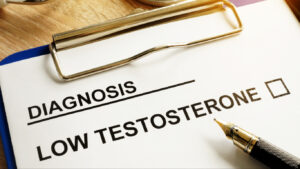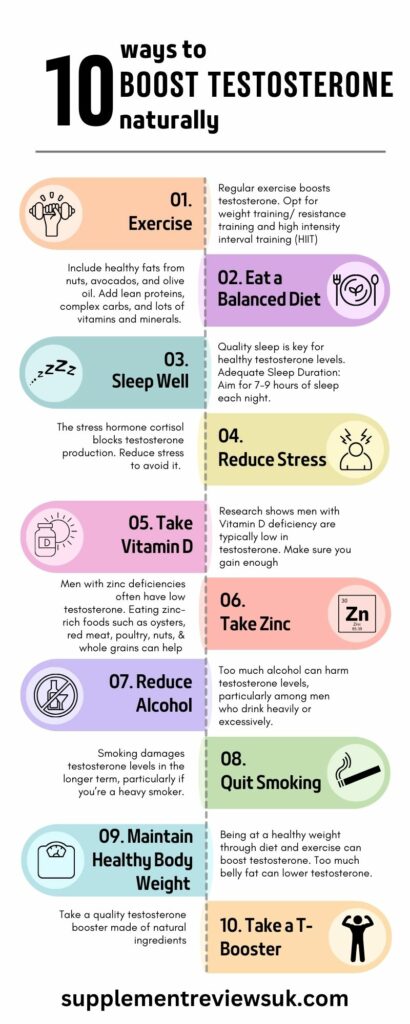
Testosterone is key for men’s health, energy, strength, and wellness, but what can you do when it starts to fall? We offer 10 ways to increase testosterone naturally…
Did you know that testosterone starts to decline by as much as 1% each year after the age of 30?
By the time you’re 40 or 50 years of age, you’ve already lost 10-20% of your natural testosterone levels.
That’s typically when it starts to show too. You might notice hair loss, muscle loss, falling libido, weight gain, difficulty sleeping, and more.
But that doesn’t mean you have to accept it.
Lifestyle Changes Proven to Increase Testosterone
 The good news is that you can boost your T levels naturally with easy lifestyle changes and smart strategies. Simple steps that can transform how you feel about your body and yourself.
The good news is that you can boost your T levels naturally with easy lifestyle changes and smart strategies. Simple steps that can transform how you feel about your body and yourself.
We’re going to show you how…
This guide will dive into testosterone’s role in men’s health. We’ll look at the signs of low testosterone and discuss how you can naturally increase testosterone. You’ll learn how to boost your testosterone and regain your energy and vitality.
But first, let’s really understand the importance of this male hormone…
Understanding Testosterone: The Vital Male Hormone
Testosterone is the main hormone in men. Made in the testes, it’s responsible for everything from the development of male sex organs and sperm to libido, facial hair, muscles and even bones.
It’s also involved in some way with almost every organ in the body, including the brain and the heart.
In short, it’s the key to a man’s health and happiness, helping with many physical and mental tasks. It also affects how men think, feel, and want to be intimate.
SUMMARY: Importance of Testosterone for Men’s Health Having enough testosterone is vital for a healthy life. This hormone helps with:
Signs and Symptoms of Low Testosterone
 As we age, our bodies change and our hormones flow and ebb. It can be tough to notice the subtle signs of testosterone loss until it builds up to become a problem, and you’re officially low in testosterone.
As we age, our bodies change and our hormones flow and ebb. It can be tough to notice the subtle signs of testosterone loss until it builds up to become a problem, and you’re officially low in testosterone.
By age 50, for instance, half of all men will experience significant hair loss, which can be a sign of low T levels.
Spotting the signs of low testosterone early can lead to timely medical help or allow you to correct the problem with lifestyle changes.
Common symptoms of low testosterone include:
- Decreased muscle mass and strength
- Fatigue and lack of energy
- Reduced sex drive and erectile dysfunction
- Weight gain, particularly around the abdomen
- Mood changes, such as depression, irritability, and difficulty concentrating
- Decreased bone density and an increased risk of osteoporosis. Yes, men can suffer from this too. 20% of men over 50 experience fractures because of osteoporosis.
- Hot flashes and night sweats
- Difficulty sleeping or insomnia
These symptoms can also point to other health issues. So, it’s vital to see a doctor for a proper check-up. If you’re experiencing these signs, talk to a healthcare expert. They can check your testosterone levels and suggest the right treatment.
Natural Ways to Increase Testosterone Levels

If you’re suffering from severe testosterone loss, you may benefit from testosterone replacement therapy via your doctor. If you want to tackle the problem naturally, however, there are ways to help boost your body’s natural hormones and increase testosterone. They also have the benefit of preventing further significant T loss and can be followed at any age.
They include:
Exercise and Weight Training
 Regular exercise boosts testosterone, but the type of exercise you do makes a difference. Weight training/ resistance training and high intensity interval training (HIIT) makes the most difference to your T levels for men, helping to increase testosterone the most.
Regular exercise boosts testosterone, but the type of exercise you do makes a difference. Weight training/ resistance training and high intensity interval training (HIIT) makes the most difference to your T levels for men, helping to increase testosterone the most.
Try squats, deadlifts, and bench presses for the best results – exercises that work multiple muscles.
Exercising regularly three to four times a week has shown a stable increase in T levels.
Balanced Diet and Healthy Fats
- Eating a nutrient-rich diet is vital for testosterone. Include healthy fats from nuts, avocados, and olive oil. These fats are key for making and increasing testosterone.
- Add lean proteins, complex carbs, and lots of vitamins and minerals. They help keep hormones balanced and your body healthy.
A balanced diet with healthy fats combines well with exercise to boost your testosterone naturally.
Get enough Sleep! How Sleep can Help Increase Testosterone
 Quality sleep is key for healthy testosterone levels. Many studies show a strong link between sleep and testosterone production.
Quality sleep is key for healthy testosterone levels. Many studies show a strong link between sleep and testosterone production.
Sleep deprivation lowers testosterone production. The body naturally releases testosterone at night, peaking in the early morning. Without enough quality sleep, this cycle is disrupted, reducing testosterone levels.
Adequate Sleep Duration: Experts say adults should aim for 7-9 hours of sleep each night. This supports healthy testosterone and overall health.
To keep testosterone levels healthy, focus on quality sleep. A consistent sleep routine, a relaxing sleep environment, and avoiding screen time before bed help improve sleep. This, in turn, helps to increase testosterone production.
Reduce Stress: Stress Management to Increase Testosterone
Chronic stress can harm testosterone levels, leading to health issues for men. The stress hormone cortisol blocks testosterone production and stops the body from reacting to its testosterone. Lowering your stress levels, therefore, helps to maintain and possibly increase testosterone.
Ideas to reduce stress: Meditation is a strong tool for managing stress. It lowers cortisol, calms the mind, and helps balance hormones. Mindfulness is also great for reducing stress. It helps men stay in the moment and manage stress effects. Activities like deep breathing and journaling are part of mindfulness. Adding relaxation practices to daily life is good for testosterone. Yoga and tai chi can reduce stress and anxiety.
Vitamins and Supplements for a Testosterone Boost
 As we know, keeping testosterone levels healthy is key for men’s well-being. Lifestyle choices are important, but certain vitamins and minerals help too.
As we know, keeping testosterone levels healthy is key for men’s well-being. Lifestyle choices are important, but certain vitamins and minerals help too.
Vitamin D and zinc are two nutrients that are known to increase testosterone. Here’s why…
Vitamin D and Testosterone
Vitamin D, known as the “sunshine vitamin,” is believed to affect testosterone levels. Research shows men with Vitamin D deficiency are typically low in testosterone too.
Vitamin D is synthesised from sunlight, and studies show that vitamin D supplementation may well help those men who are suffering from low testosterone.
The NHS recommends that all adults supplement with vitamin D in the autumn and winter months anyway, so even if you’re not low in T, it can only help.
We recommend: Performance Lab Vitamin D3 + K2
Read our review on Performance Lab Vitamin D3 + K2
Zinc and Testosterone
Zinc is crucial for testosterone production. It helps turn cholesterol into testosterone and supports luteinizing hormone production.
This hormone tells the testes to make testosterone. Men with zinc deficiencies often have low testosterone.
Eating zinc-rich foods such as oysters, red meat, poultry, nuts, and whole grains can help, as can taking supplements. Zinc is good for reproductive health too.
We recommend: Performance Lab Zinc
Other Lifestyle Changes to Improve Testosterone Levels
Keeping a healthy lifestyle is key to boosting your T-levels. Simple changes in your daily life can help increase testosterone. Let’s look at some lifestyle tweaks that can enhance testosterone production.
Reduce Alcohol Consumption
Too much alcohol can harm testosterone levels, particularly among men who drink heavily or excessively. Cutting down or stopping alcohol can help balance your hormones. Try to limit drinks to one or two a day and have alcohol-free days.
Quit Smoking
The association between smoking and testosterone levels seems to be contradictory, with some studies showing a slight increase in T levels among smokers while others show a fall.
The commonly accepted logic is that smoking causes a slight increase in testosterone to begin with, but damages T levels in the longer term, particularly if you’re a heavy smoker.
And we all know that smoking isn’t good for you for a whole host of reasons, so stopping smoking is a good step to protect your testosterone levels in the longer term.
Maintain a Healthy Body Weight
- Being at a healthy weight through diet and exercise can boost testosterone.
- Too much belly fat can lower testosterone.
- Strength training, like weightlifting, builds muscle and supports testosterone.
By adopting these lifestyle changes, you can actively support your testosterone levels and health. A balanced approach that includes diet, exercise, and managing stress is essential to increase testosterone and live a fulfilling life.
Take a Safe Testosterone Boosting Supplement
Another option to boost flagging levels of testosterone or to maintain your T levels as you age is to take a natural testosterone booster. These are supplements made of natural ingredients – herbs, vitamins, plant extracts and more – that are shown to have positive effects on hormones and increase testosterone levels. Look for ones that:
- Come from a reputable provider
- Contain safe ingredients without any crazy mega doses
- Are tailored to your specific needs (i.e., bodybuilding, older man etc…)
- Have a clean production process
- Are transparent about their ingredients and doses
- Have significant customer reviews and recommendations behind them
We recommend:
Prime Male – best for older men
Hunter test – for men with low testosterone
TestoFuel – for men who want testosterone boosters for bodybuilding
Please check with a doctor before starting any testosterone treatment if your condition is severe or you have existing health issues.